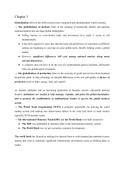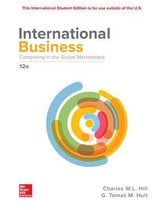Chapter 1
Globalization refers to the shift toward a more integrated and interdependent world economy.
→ The globalization of markets refers to the merging of historically distinct and separate
national markets into one huge global marketplace.
● Falling barriers to cross-border trade and investment have made it easier to sell
internationally.
● It has been argued for some time that the tastes and preferences of consumers in different
nations are beginning to converge on some global norm, thereby helping create a global
market.
● However, significant differences still exist among national markets along many
relevant dimensions.
● A company does not have to be the size of a multinational giant to facilitate, and benefit
from, the globalization of markets.
→ The globalization of production refers to the sourcing of goods and services from locations
around the globe to take advantage of national differences in the cost and quality of factors of
production (such as labor, energy, land, and capital).
As markets globalize and an increasing proportion of business activity transcends national
borders, institutions are needed to help manage, regulate, and police the global marketplace
and to promote the establishment of multinational treaties to govern the global business
system.
→ The World Trade Organization (WTO) is primarily responsible for policing the world
trading system and making sure nation-states adhere to the rules laid down in trade treaties
signed by WTO member states.
→ The International Monetary Fund (IMF) and the World Bank were both created for:
● The IMF was established to maintain order in the international monetary system;
● The World Bank was set up to promote economic development.
The world bank has focused on making low-interest loans to cash-strapped governments in poor
nations that wish to undertake significant infrastructure investments (such as building dams or
roads).
,The IMF is often seen as the lender of last resort to nation-states whose economies are in
turmoil and whose currencies are losing value against those of other nations.
● IMF loans come with strings attached, however; in return for loans, the IMF requires
nation-states to adopt specific economic policies aimed at returning their troubled
economies to stability and growth.
When states become members of the United Nations, they agree to accept the obligations of the
UN Charter, an international treaty that establishes basic principles of international relations.
→ According to the charter, the UN has four purposes:
● to maintain international peace and security,
● to develop friendly relations among nations,
● to cooperate in solving international problems and in promoting respect for human rights,
● and to be a center for harmonizing the actions of nations.
→ Another institution in the news is the Group of Twenty (G20). The G20 comprises the
finance ministers and central bank governors of the 19 largest economies in the world, plus
representatives from the European Union and the European Central Bank.
Two macro factors underlie the trend toward greater globalization.
→ The first is the decline in barriers to the free flow of goods, services, and capital that has
occurred in recent decades.
→ The second factor is technological change, particularly the dramatic developments in
communication, information processing, and transportation technologies.
International trade occurs when a firm exports goods or services to consumers in another
country.
Foreign direct investment (FDI) occurs when a firm invests resources in business activities
outside its home country.
The growing integration of the world economy into a single, huge marketplace is increasing the
intensity of competition in a range of manufacturing and service industries.
, Many of the barriers to international trade took the form of high tariffs on imports of
manufactured goods.
→ The typical aim of such tariffs was to protect domestic industries from foreign competition.
The cost of microprocessors continues to fall, while their power increases (a phenomenon known
as Moore’s law, which predicts that the power of microprocessor technology doubles and its cost
of production falls in half every 18 months)
A multinational enterprise (MNE) is any business that has productive activities in two or more
countries.
In the last half a century, two notable trends in the demographics of the multinational
enterprise have been
(1) the rise of non-U.S. multinationals and
(2) the growth of mini-multinationals.
An international business is any firm that engages in international trade or investment.
→ A firm does not have to become a multinational enterprise, investing directly in operations in
other countries, to engage in international business, although multinational enterprises are
international businesses. All a firm has to do is export or import products from other countries.
Chapter 2
We use the term political economy to stress that the political, economic, and legal systems of a
country are interdependent; they interact with and influence each other, and in doing so, they
affect the level of economic well-being
By political system, we mean the system of government in a nation.
→ Political systems can be assessed according to two dimensions.
● The first is the degree to which they emphasize collectivism as opposed to individualism.
● The second is the degree to which they are democratic or totalitarian.






